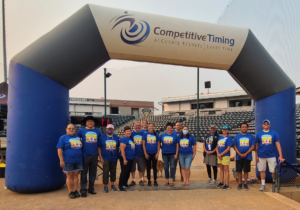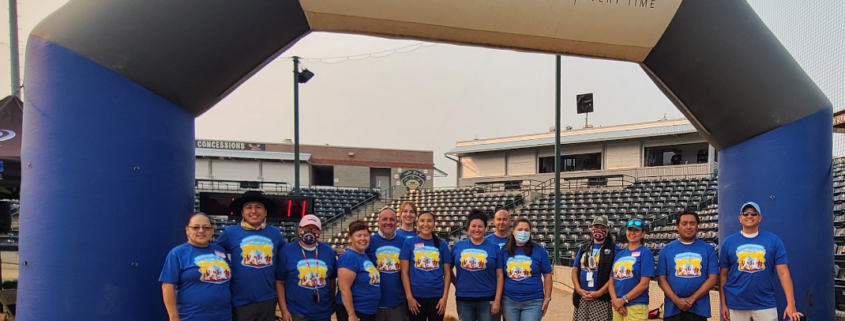Native American Heritage Month UIO Spotlight: All Nations Health Center
Native American Heritage Month is more than just a 30-day celebration, it’s a reminder that important work is happening every day to ensure Native communities everywhere have equitable access to services and representation.
NCUIH would like to introduce an Urban Indian Organization (UIO) and NCUIH member, All Nations Health Center in Missoula, Montana, who are at the frontlines of this important work and are representative of the imperative efforts of over 40 Urban Indian Organizations across the country.
We asked Executive Director, Skye McGinty (Little Shell Chippewa), MA, MBA, a few questions about their experiences in the UIO community, through the lens of All Nations, and what are some important things to keep in mind during Native American Heritage Month for both Native and Non-Native community members.

A picture of the All Nations team at their 3rd Annual 5K Fun Run and Walk.
Q: What do you wish the public knew about your services? Are there any misconceptions?
A: In late 2020, we changed our name from Missoula Urban Indian Health Center to All Nations Health Center to better reflect the culture of our clinic and our mission to provide holistic health services to the communities who live in and around Missoula. The biggest misconception in our community is that our services are only for Native people. While we do have an Indigenous perspective on the delivery of health services and our primary focus is on the Native population, we serve non-Natives, too. We hear time and time again from our non-Native clients that the kinds of services we provide and the way we deliver them is special and different compared to what you might experience in a Western medicine setting. If we could clear up any misconceptions, it’s that we provide services to truly all nations, and our Indigenous providers and services are for everyone.
Q: Why do you think organizations specific to serving Native communities are important?
A: It’s vital that Native people have access to services where their lived experiences are honored, they are reflected in the makeup of the staff, and strengthening their resiliency is at the top of the list of priorities. Native organizations provide that safety and honoring in ways that other organizations can’t. Good allyship from non-Native organizations is critical to moving the needle on issues that most deeply impact our Indigenous communities, but Native organizations already have the knowledge to reach our communities and make lasting, positive impacts. It’s imperative that we as Native people are leading the services that we provide to our communities.
Q: What’s the biggest challenge you face as an organization?
A: Aside from the obvious answer of COVID, our organization struggles with consistent levels of federal and state funding. Like many UIOs, our budget largely consists of a patchwork of different federal, state, and local grant initiatives. It’s hard to plan for sustainability when continuation applications, reporting requirements, and new grants are all due. Combined with the fact that UIOs have largely been left out of language in legislation that impacts our ability to be self-sustaining, finding reliable funding sources remains our largest challenge.
Q: What excites you about the future of your facility?
A: I am most excited about having a truly integrated model of care for our patients in our new facility. Right now, our services are spread out among three facilities, and with the launch of our capital campaign, we’ll be able to consolidate all services in one brand new patient-centered medical home. I’m excited to bring on new providers to complement our current service offerings and to expand into new services that are comprehensive, holistic, and informed by Indigenous knowledge.
NCUIH is excited to share the experience of All Nations and recognize the many other essential UIOs providing vital services to their communities across the country. You can check out the full list of UIO NCUIH Members here. We hope this Native American Heritage Month, we can all re-center the needs of our urban Native communities across Indian Country. Sharing challenges, celebrating how far we’ve come, and looking forward to the future are all incredible ways to stay involved this month and always.
Looking for a way to engage with NCUIH and help raise awareness and much-needed funds towards social health equity? Register today for the #MoveWithNCUIH Native American Heritage Month Virtual 5k! Together we will walk, run, bike, swim (or however you choose to move) from a safe distance and celebrate our efforts virtually with one another.



Leave a Reply
Want to join the discussion?Feel free to contribute!